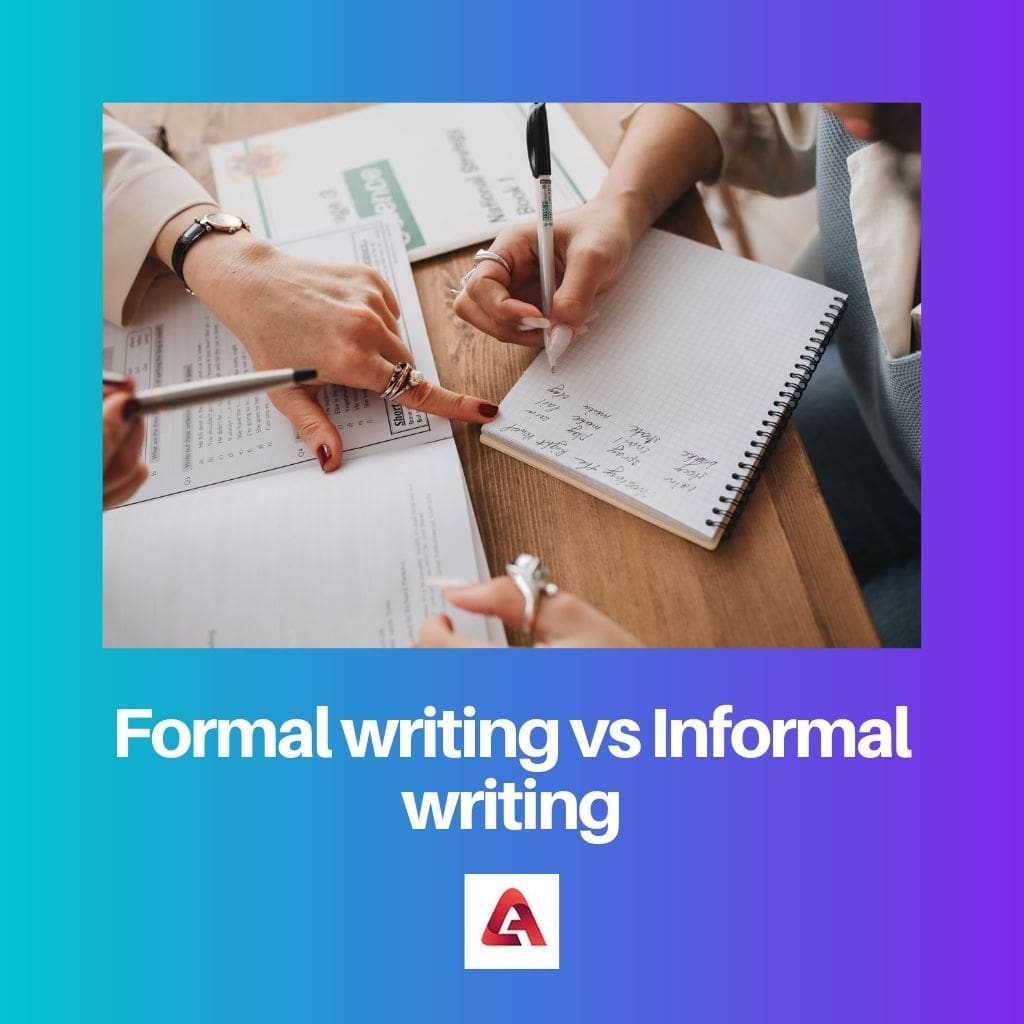Writing is a way to express facts, opinions, beliefs, and many other aspects. Writing can be done through formal writing or informal writing.
Key Takeaways
- Formal writing follows strict rules and conventions, using formal language, complete sentences, and proper grammar, and is used in academic or professional contexts.
- Informal writing is more casual and conversational, allowing for colloquial language, contractions, and relaxed grammar rules, and is common in a personal communication or creative writing.
- The choice between formal and informal writing depends on the purpose, audience, and context of the communication, with formal writing conveying a sense of professionalism and authority and informal writing fostering a more personal, relatable tone.
Formal Writing vs Informal Writing
Formal writing has a complex sentence structure written for people you don’t know personally. It avoids the use of personal pronouns, colloquial or slang terms. Informal writing has a shorter sentence structure used in more personal settings and allows nonstandard English forms and colloquial vocabulary.

However, the above is not the only difference. A comparison between both the terms on specific parameters can shed light on subtle aspects:
Comparison Table
| Parameter of Comparison | Formal Writing | Informal Writing |
|---|---|---|
| Meaning | Writing which is more professional and official in tone | Writing which is more personal and casual |
| Personal aspect | Lacks personal touch | It has a personal touch to the writing |
| Type of tone | It has a professional tone to the writing | Lacks a professional tone to the writing. Informal writing has a casual tone. |
| Type of voice | Passive voice | Active voice |
| Use of colloquialism | No use of colloquialism | More use of colloquialism |
| Use of words such as “I” and “We.” | There is no use of or occasional use of words like “I” or “We.” | More use of words like “I” and “We.” |
| Usage of slang | No slang, as formal writing is mainly written for business or official purposes. | The usage of slang is prevalent |
| Type of sentences | Complicated and long | Simple, short and straightforward |
| Use of interjections/ exclamations | No use of interjections or exclamations | There is frequent use of interjections or exclamation marks |
| Use of contractions | Less | More |
| Use of emotional language | No | Yes |
| Structuring of words | Words are perfectly structured | Comments can be loosely structured |
| Utilization | Formal writing is used for business purposes (especially to any client or superiors), professional purposes, education, or academic purpose. | Informal writing is used for writing personal emails and personal or quick invitations. Informal writing may be used with care in official communication, but use will be infrequent. |
| Intended audience | Business people, university people, professional stakeholders | Friends, family |
| Example | John is believed to be not reliable | I believe that John is not reliable, don’t you think so? |
| Time usage | More time and effort will be required to construct formal writing | Fewer efforts and time will be required to develop an informal writing |
What is Formal Writing?
Formal writing, as the name denotes, means writing of a formal nature. In other words, legal writing is written following specific rules of writing.
Formal writing is used for formal purposes. Formal purpose can be varied, but something quite common could be a situation where a person is not very friendly with the other person to whom the communication is being made or is writing to someone in an official capacity.
Formal writing may be considered difficult to write because of the inclusion of specific rules such as the choice of correct words, avoiding repetition of words, avoiding any emotional tone or jargon, and other aspects.
Formal writing comes with long and compound sentences and passive voice. Further, formal writing will not use personal pronouns such as “I”, “We”, “You”, etc. Legal writing is commonly used for business, academics, and other professional purposes.

What is Informal Writing?
Informal writing, as the name denotes, is writing of informal nature. In other words, an informal essay is writing with a relaxed, friendly, or unofficial style or manner.
Informal writing is full of colloquialism, full of casual, relaxed, friendly, and maybe even slangy writing. There is an intense usage of active voice in informal writing, and the focus is on the subject.
Informal writing will not have any specific rules to be followed for making the conversation. Informal writing will have straightforward and short sentences.
Informal writing is commonly used for personal, ordinary, familiar, or informal communication or conversation. Informal writing, if not used properly, may even hurt the feelings of the intended recipients.

Main Differences Between Formal Writing and Informal Writing
- Formal writing is professional. Informal writing is personal.
- Formal writing does not use colloquialisms. Informal writing makes use of colloquialisms.
- Formal writing is used for business, professional and academic writing. Informal writing is utilized for writing personal emails.
- Formal writing will utilize passive voice. Informal writing will utilize active voice.
- Formal writing does not use slang. Informal writing may use slang.
- Formal writing will have long and compound sentences. Informal writing will have short, straightforward and easy sentences.

- https://journals.sagepub.com/doi/abs/10.1177/0093650210362465
- https://www.degruyter.com/downloadpdf/journals/text/23/3/article-p321.xml

This article provides a comprehensive understanding of the elements that differentiate formal and informal writing. It’s impressive to see the attention to detail and clarity in the explanation of these writing styles.
Absolutely, the breakdown of the type of tone, voice, and personal aspect in both formal and informal writing is particularly enlightening for writers aiming to refine their craft.
The detailed comparison between formal and informal writing styles effectively encapsulates the essence of each, enabling writers to discern the apt application of these styles in various contexts for optimal impact.
I couldn’t agree more. This article is a well-structured and informative guide that equips writers with the knowledge and understanding to harness the distinct attributes of formal and informal writing.
As a writer, I appreciate the detailed breakdown of the key differences between formal and informal writing. The examples provided for each style are very helpful in understanding their distinct characteristics.
I’m glad to see a fellow writer benefit from this article. It’s crucial to grasp the fundamental disparities between formal and informal writing when crafting compelling content.
The specific parameters discussed in the comparison table offer a thorough analysis of the unique qualities of formal and informal writing, making this article a valuable resource for aspiring writers.
I find this article very informative and well-written. It provides a clear definition of formal and informal writing and their differences, highlighting the importance and proper use of each style in various contexts.
I couldn’t agree more. The comparison table is especially useful for understanding the specific nuances in tone, voice, and language used in formal and informal writing.
I found this article to be an insightful exploration of formal and informal writing styles. The distinction between the use of language and tone in different contexts is clearly delineated, offering valuable insights for writers.
I appreciate the comprehensive breakdown of the characteristics and utilization of formal and informal writing styles. This article elucidates the significance of context and audience in determining the appropriate style for effective communication and expression.
Indeed, the emphasis on understanding the diverse applications of formal and informal writing fosters a more nuanced perspective on the art of writing and articulation.
The article successfully highlights the nuanced differences between formal and informal writing, serving as a valuable resource for writers to enhance their proficiency in employing various writing styles for different purposes.
The distinctions elucidated in this article regarding formal and informal writing are pertinent to the art of effective communication, emphasizing the need for a conscientious consideration of the intended audience and purpose.
Absolutely, this article is an indispensable tool for aspiring writers and professionals alike, offering insightful analysis and comparisons to strengthen their command over formal and informal writing.
The article provides an in-depth analysis of the varying aspects of formal and informal writing, highlighting the importance of tailoring writing styles to effectively convey intended messages. A commendable resource for writers seeking clarity on this topic.
This article serves as an excellent guide for writers to navigate the nuances of formal and informal writing, offering practical insights and examples that enrich the understanding of these styles.
Absolutely, the article resonates with the need for precision and discernment when choosing between formal and informal writing styles to ensure the most impactful and engaging content.
This article is quite insightful. I didn’t realize there were so many differences between formal and informal writing styles. It’s interesting to see how the intended audience and purpose play a crucial role in choosing the appropriate writing style.
The article effectively distinguishes between formal and informal writing, reinforcing the significance of choosing the appropriate style to suit different contexts and audiences. It’s an essential guide for writers aiming to enhance their communication skills.
This article makes me reassess my approach to writing. I appreciate the articulated details about the implications and characteristics of formal and informal writing, adding more depth to the understanding of these writing styles.
Agreed. The examples and comparisons presented in this article are immensely helpful in recognizing when to utilize formal or informal writing based on the intended purpose and the desired impact on the reader.